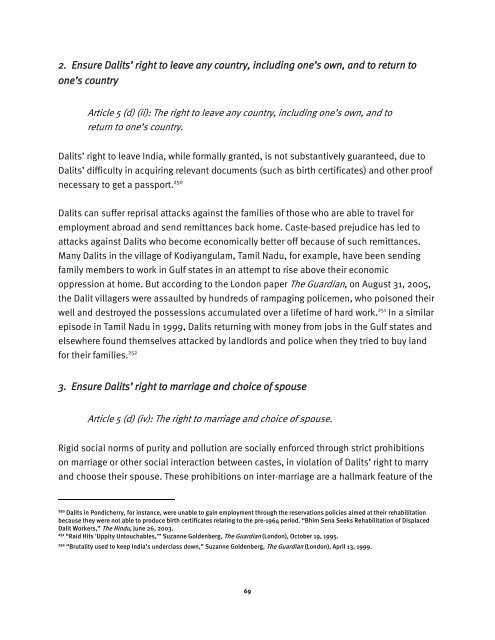Caste Discrimination against India's âUntouchablesâ - Human Rights ...
Caste Discrimination against India's âUntouchablesâ - Human Rights ...
Caste Discrimination against India's âUntouchablesâ - Human Rights ...
Create successful ePaper yourself
Turn your PDF publications into a flip-book with our unique Google optimized e-Paper software.
2. Ensure Dalits’ right to leave any country, including one’s own, and to return to<br />
one’s country<br />
Article 5 (d) (ii): The right to leave any country, including one’s own, and to<br />
return to one’s country.<br />
Dalits’ right to leave India, while formally granted, is not substantively guaranteed, due to<br />
Dalits’ difficulty in acquiring relevant documents (such as birth certificates) and other proof<br />
necessary to get a passport. 250<br />
Dalits can suffer reprisal attacks <strong>against</strong> the families of those who are able to travel for<br />
employment abroad and send remittances back home. <strong>Caste</strong>-based prejudice has led to<br />
attacks <strong>against</strong> Dalits who become economically better off because of such remittances.<br />
Many Dalits in the village of Kodiyangulam, Tamil Nadu, for example, have been sending<br />
family members to work in Gulf states in an attempt to rise above their economic<br />
oppression at home. But according to the London paper The Guardian, on August 31, 2005,<br />
the Dalit villagers were assaulted by hundreds of rampaging policemen, who poisoned their<br />
well and destroyed the possessions accumulated over a lifetime of hard work. 251 In a similar<br />
episode in Tamil Nadu in 1999, Dalits returning with money from jobs in the Gulf states and<br />
elsewhere found themselves attacked by landlords and police when they tried to buy land<br />
for their families. 252<br />
3. Ensure Dalits’ right to marriage and choice of spouse<br />
Article 5 (d) (iv): The right to marriage and choice of spouse.<br />
Rigid social norms of purity and pollution are socially enforced through strict prohibitions<br />
on marriage or other social interaction between castes, in violation of Dalits’ right to marry<br />
and choose their spouse. These prohibitions on inter-marriage are a hallmark feature of the<br />
250<br />
Dalits in Pondicherry, for instance, were unable to gain employment through the reservations policies aimed at their rehabilitation<br />
because they were not able to produce birth certificates relating to the pre-1964 period. “Bhim Sena Seeks Rehabilitation of Displaced<br />
Dalit Workers,” The Hindu, June 26, 2003.<br />
251<br />
“Raid Hits 'Uppity Untouchables,'” Suzanne Goldenberg, The Guardian (London), October 19, 1995.<br />
252<br />
“Brutality used to keep India’s underclass down,” Suzanne Goldenberg, The Guardian (London), April 13, 1999.<br />
69

















